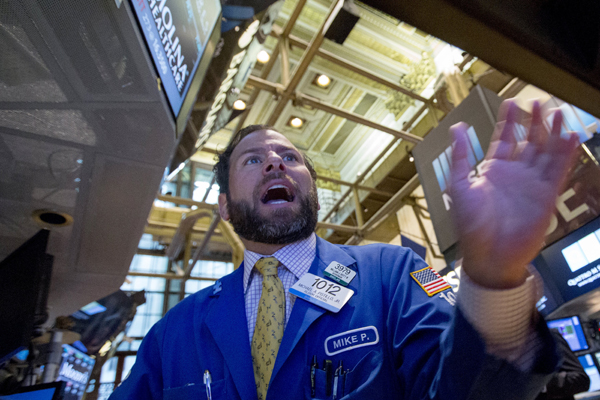|
 |
|
A trader works on the floor of the New York Stock Exchange August 24, 2015. Wall Street opened sharply lower on Monday with the Dow Jones industrial average losing more than a 1,000 points following a more-than 8 percent drop in Chinese shares and a selloff in oil and other commodities. REUTERS/Brendan McDermid |
US stock indices were more than 2-percent lower in afternoon trade on Monday but were off the day's worst levels after a dramatic turnaround in shares of Apple helped boost sentiment.
The Dow Jones industrial average briefly slumped more than 1,000 points, its biggest point-drop ever.
But by 2:20 pm, the Dow had recovered somewhat to trade down 362.12 points, or 2.2 percent at 16,097.63 as bargain hunters stepped in. The Dow has never lost more than 800 points in a day.
"In all likelihood, this is a buying opportunity in what is still a global economic expansion. But we are proceeding cautiously," said Jason Pride, Director of Investment Strategy at Glenmede, with $30 billion in assets under management.
The rout in US equities followed an 8.5 percent decline in Chinese markets, which sparked a selloff in global stocks along with oil and other commodities.
Apple slid as much as 13 percent before recovering most of that loss to trade 0.4 percent lower at $105.30.
Apple's dramatic turnaround helped the Nasdaq Composite and the S&P 500 indexes pull away from levels that would have put them into correction mode. An index is considered to be in correction when it closes 10 percent below its 52-week high.
The S&P 500 was down 2.56 percent at 1,920.39 while the Nasdaq Composite was off 2.2 percent at 4,602.51.
All of the 10 major S&P 500 sectors were down, with energy losing 4.08 percent. At one point, all 30 stocks on the Dow and more than 90 percent of the S&P 500 stocks were at least 10 percent below their 52-week highs.
The CBOE Volatility index, popularly known as the "fear index", jumped as much as 90 percent to 53.29, its highest since January 2009.
The S&P 500 index showed 186 new 52-week lows and just two highs, while the Nasdaq recorded 593 new lows and seven highs.
Alibaba was down about 2.06 percent at $66.70, below its IPO price of $68, making it the second high-profile tech company to fall below its IPO price in the past week after Twitter on Thursday.
